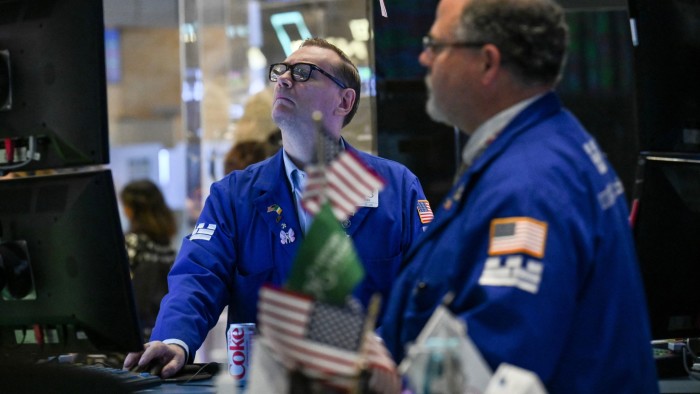Stay informed with free updates
Simply sign up to the Investment Banking myFT Digest — delivered directly to your inbox.
Wall Street executives are counting on their traders to offset tepid deal fees this quarter, after Donald Trump’s trade war threats made markets gyrate.
Senior bankers say the market swings prompted by the US president’s “liberation day” declaration of higher tariffs led to a flurry of buying and selling by investors, even as corporate boardrooms put deals on ice.
“Trading continues to be helped by volatility, with equity trading likely to continue to outperform fixed-income trading,” said Mike Mayo, a banking industry analyst at Wells Fargo. “Investment banking is likely to decline year-over-year given continued uncertainty around policy.”
Bank executives appear confident that the record income from equities trading that juiced first-quarter results will be followed by another solid performance in the second quarter.
“With the S&P grinding higher, the wall of worry being climbed, the sense that perhaps the outlooks are in fact improving again, the markets businesses — led by our equities business but also the stability of fixed income — have hung in there,” Morgan Stanley chief executive Ted Pick said at his bank’s financial conference in New York last week.
The continued surge in equity trading is expected to be partly offset by slower growth in revenue from desks that trade fixed income, foreign exchange and commodities.
John Waldron, president and chief operating officer at Goldman Sachs, hinted the bank had been stung by tariff-induced volatility by revealing this month it had “moderated our risk positioning”.
Goldman’s fixed-income trading had been “slightly softer” but overall client activity “remained robust pretty much throughout the year . . . particularly in equities”, he said.
Wall Street banks are also braced for a drop in fees from advising companies on mergers and acquisitions, share and debt sales, and IPOs, due to a reluctance to launch big deals without more clarity on US trade policy.
Bank of America chief executive Brian Moynihan confirmed the gloomy outlook last week, saying he expected its investment banking revenue to be down about 25 per cent in the quarter from last year, adding that this was “not where we want to be”.
But Moynihan said it would be offset by mid-to-high single-digit percentage growth in trading revenues at BofA’s markets business.
Troy Rohrbaugh, co-head of JPMorgan Chase’s commercial and investment bank, made a similar prediction: steady growth in markets offset by a mid-teens percentage drop in investment banking fees.
Deutsche Bank CEO Christian Sewing also bemoaned how a flurry of delayed deals meant investment banking income would be “weaker than we initially thought”. Deutsche’s fixed-income traders, however, had bounced back from a “rough start” to April, he said.
Citigroup’s head of banking, Vis Raghavan, said last week the group expected year-on-year growth in both its markets and investment banking revenues.

With only two weeks to go before the end of June, the value of M&A announced so far in the quarter is up 21 per cent, according to LSEG. However, there is a lag between deals being announced and advisers earning fees when they close, and the number of deals is still down 22 per cent. The value and number of initial public offerings are both down more than 10 per cent.
Wall Street executives have, however, been encouraged by a number of strongly performing IPOs — US fintech Chime’s debut on Thursday was the latest. There have also been a flurry of acquisitions in recent weeks, fuelling optimism about a build-up of transactions waiting to be unleashed.
Morgan Stanley’s Pick said he was “encouraged” by the pick-up in deals, adding: “I do think the corporate boardroom around the world is saying we do need to act.”
Raghavan at Citi noted IPOs in tech and digital assets had done well thanks to the sector’s relative lack of exposure to potential tariff shocks, though it was more challenging to price companies potentially impacted by protectionist measures.
Goldman’s Waldron also said the bank was set to be busier this summer — “as long as we don’t have any more exogenous shocks, or more disruptive policy, which is maybe a big if”.




